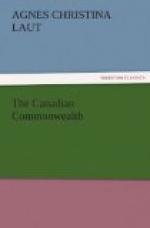It did not make things easier for Hopkinson that the whole dispute as to Hindu immigration was relegated into that doubtful resort of all ambiguous politics—“the twilight zone”—or the doubtful borderland where provincial powers end and federal powers begin and Imperial powers intervene. England was shoving the burden of decision on the Dominion, and the Dominion was shoving the burden on the Province of British Columbia, and to evade responsibility each government was shuttling the thing back and forward, weaving a tangle of hate and misunderstanding which culminated in Hopkinson’s assassination in 1914.
As “the twilight zone” between provincial and federal rights comes up here, it should be considered and emphasized; for it is the one great weakness of every federation. Who is to do what—when neither government wants to assume responsibility? Who is to enforce laws, when neither government wants to father them? It was this gave such passion to Vancouver’s resentment in Hindu immigration. Indeed this very question of “a twilight zone” gives pause to many an Imperial Federationist. In a dispute of this sort, involving the parts of the empire, could England give force to an exclusion act without losing the allegiance to her British Empire?
Every conceivable argument has been used in this Hindu dispute. I want to emphasize—they are arguments, used for argument’s sake—not reasons. The plain brutal bald reasons on each side of the dispute are British Columbia does not want the Hindus. The Hindus want British Columbia. Simultaneously with the campaign for publicity action was taken: (1) to force the resident Hindu on the voters’ list; (2) to break down the immigration laws by demanding the entrance of wives and families; (3) to force recognition of the status of the Oriental by bringing them in the ships of Japan—England’s ally.
If the resident Hindu had a vote—and as a British subject, why not?—and if he could break down the immigration exclusion act, he could out-vote the native-born Canadian in ten years. In Canada are five and one-half million native born, two million aliens. In India are hundreds of millions breaking the dykes of their own national barriers and ready to flood any open land. Take down the barriers on the Pacific Coast, and there would be ten million Hindus in Canada in ten years. The drawing of Japan into the quarrel by chartering a Japanese ship was a crafty move. Japan is the empire’s ally. Offense to Japan means war.
III
The arguments from both sides I set down in utter disinterest personally. Here they are:
We need room for colonization—says the Hindu. Let England lose India, and she loses five-sixths of the British Empire. By refusing admission to the Hindu, Canada is endangering British dominion in India. Moral conditions there are appalling, of course; but say the missionaries—give these people a chance, and they will become as good as any of us. Are we not sprung from the same Aryan stock?




